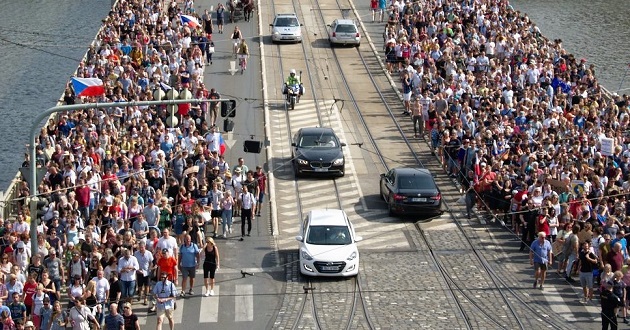Should Christians join protests?
Kingdom values have helped bring radical transformation in society precisely when Christians understood their calling to be salt and light in the public square.
03 JULY 2019 · 12:32 CET

“Christians are called to evangelise, not to get involved in political fights”. Many of us may have heard this kind of argument in a church context. Jesus called his followers to preach repentance and faith in God, it is said, not to pursue other causes.
Nevertheless, History shows us that Kingdom values have helped bring radical transformation in societies in Europe and around the world precisely when Christians understood their calling to be salt and light in the public square.
We could mention the Wilberforce’s, the Luther Kings and the Eidenbenz’s. But there are thousands of other more local examples of how faithful and committed believers made a difference in their cities because of their understanding of Christian justice, love for their neighbours and passion for seeing God’s Kingdom come.
In recent weeks, this kind of engagement of Christians has been visible in several places.
CHRISTIANS TAKING THE STREETS
One example is the engagement of Christian communities during the anti-extradition bill protests in Hong Kong. Leaders openly supported the cause, and thousands of young church members joined the peaceful protests. “Sing Hallelujah to the Lord” suddenly became an unofficial anthem heard every day. The demand to keep Hong Kong away from mainland China’s restriction of freedoms resounded with churches not only because of the risk of losing religious freedom. The Christian engagement went beyond their interests, and Christians peacefully marched to protect the rights of all fellow citizens.
Also in the Czech Republic, groups of Christians joined hundreds of thousands in Prague to denounce governmental corruption and fraud. In a predominantly atheist country, believers expressed they shared desire for transparent institutions and clean government. In neighbouring Slovakia, evangelicals last year also voiced their opposition to corruption: “Christians have been called to shed light on what is wrong with the system”, they said.
In Latin America, evangelical leaders have found ways to come together and present a common voice on important social realities. Several representatives were heard at the Assembly of the powerful Organisation of American States a week ago, hearing the Christian perspective on issues like family, life, corruption and trafficking.
The voices of young Christians have also been especially when it comes to protecting the planet. Students joined the #FridaysForFuture protests, urging churches to further think about our responsiblity in caring for creation.
JESUS’ MANIFESTO
Are these Christians wrong when they join others in denouncing injustice?
Jesus Christ himself was very clear when he first expounded his plans for ministry. In Luke 4:17-21, we read:
“He stood up to read, and the scroll of the prophet Isaiah was handed to him. Unrolling it, he found the place where it is written:
‘The Spirit of the Lord is on me, because he has anointed me to proclaim good news to the poor. He has sent me to proclaim freedom for the prisoners and recovery of sight for the blind, to set the oppressed free, to proclaim the year of the Lord’s favour’.
Then he rolled up the scroll, gave it back to the attendant and sat down. The eyes of everyone in the synagogue were fastened on him. He began by saying to them, ‘Today this scripture is fulfilled in your hearing’”.
A CRITICAL EYE ON AUTHORITY
“The Bible shows us examples of legitimate opposition to the abuse of power by those in authority, and it is not simply limited to the subject of preaching the Gospel”, defended X. Manuel Suárez in the article Romans 13 and the submission to the authority.
We agree with him in that “God does not demand us to subject ourselves without first casting a critical eye over those who sit in the seat of authority”.
Proclaiming the gospel implies following Jesus in all spheres of society. Therefore, “set the oppressed free” may mean at some point to join a demonstration in your city or work with non-Christians in worthy projects.
Let’s live out the gospel in a way that shows that Christ is Lord over every millimetre of the world.
Published in: Evangelical Focus - sin definir - Should Christians join protests?
